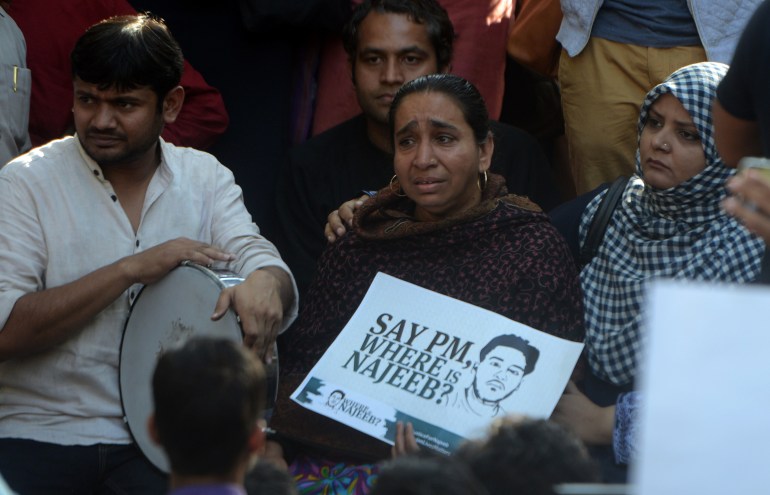Fatima Nafees waits for her eldest son Najeeb Ahmed’s return, nearly five years after he disappeared from JNU campus.
![A wailing Fatima Nafees with JNU students protesting outside the CBI headquarters in New Delhi over Najeeb Ahmed's disappearance [File: Raj K Raj/Hindustan Times via Getty Images]](https://www.aljazeera.com/wp-content/uploads/2021/08/GettyImages-924582358.jpg?resize=770%2C513)
![A wailing Fatima Nafees with JNU students protesting outside the CBI headquarters in New Delhi over Najeeb Ahmed's disappearance [File: Raj K Raj/Hindustan Times via Getty Images]](https://www.aljazeera.com/wp-content/uploads/2021/08/GettyImages-924582358.jpg?resize=770%2C513)
As the world marks the International Day of the Victims of Enforced Disappearances, a mother in India is waiting for her son’s return, nearly five years after he disappeared.
Najeeb Ahmed went missing from the prestigious Jawaharlal Nehru University (JNU) in the national capital of New Delhi on October 15, 2016, after a reported scuffle with members of the Akhil Bharatiya Vidyarthi Parishad (ABVP), a student wing of the far-right Rashtriya Swayamsevak Sangh (RSS).
The RSS, founded in 1925 along the lines of Germany’s Nazi party, is the ideological mentor of the governing Bharatiya Janata Party (BJP) and counts Prime Minister Narendra Modi and a number of top BJP politicians among millions of its lifelong members across India.
Ahmed’s case has been investigated by the country’s top investigation agencies but his family believes the authorities are in cahoots with those responsible for the student’s disappearance.
Nothing is known about the disappearance of the 31-year-old biotechnology student who was doing his masters at JNU. Hailing from a poor family, he was the eldest of three brothers and one sister.
But Fatima Nafees, Ahmed’s mother, said she has not given up hope of seeing her son again.
“I still believe that he is alive and has been put in some jail. One day he will definitely come back,” she told the Anadolu Agency.
 Fatima Nafees, holding placard, with ex-JNU student leader Kanhaiya Kumar, left, and others during a protest march in New Delhi [File: Parveen Negi/The India Today Group via Getty Images]
Fatima Nafees, holding placard, with ex-JNU student leader Kanhaiya Kumar, left, and others during a protest march in New Delhi [File: Parveen Negi/The India Today Group via Getty Images]Nafees said she is angry with the government because, after nearly five years, her son has not been found.
“His disappearance was part of a conspiracy by the government, so not much can be expected from them. My child has been used as a pawn by others,” she said, without naming who the “others” were.
Ahmed enrolled at JNU on August 1, 2016, and disappeared on October 15 that year.
“First, the case of Kanhaiya Kumar and then Najeeb. These two incidents created fear among people the government sees as its distractor,” said Nafees.
“But I would like to say that one should not be afraid. Everyone is entitled to study at JNU and these people (referring to those in power) are afraid of us. They don’t want us to go there (JNU), that’s why they do such things.”
“It is surprising and shocking that top government agencies have investigated Najeeb’s case but no one has been able to find him… All of them are clueless,” said Nafees.
“First, Delhi Police investigated his case, then the Crime Branch of the police, and finally the Central Bureau of Investigation (CBI), which is the country’s premier investigation agency.”
In Ahmed’s case, police registered a First Information Report (FIR) was on October 15, 2016. Nine people were named as suspects behind his disappearance.
The police investigation did not make much progress. Unhappy with the probe, Nafees went to the Delhi High Court the next month.
In May 2017, the court handed the case to the CBI, which is controlled by the federal home ministry. In December that year, Ahmed’s mother again alleged that the CBI was not interrogating the suspects the way it should.
The CBI in May 2018 said it found no evidence to show that a crime had been committed against Najeeb. In October that year, the investigating agency filed a closure report with the Delhi High Court, effectively ending its probe in the case.
Nafees says that, from the beginning, the police and investigating agencies tried to weaken the case and shield the suspects.
“They did not act with alacrity to recover Najeeb. But I would not let these people succeed in their design,” she said.
Ahmed’s younger brother, Haseeb, said the family is ready for a new legal battle. For Nafees, the fight continues until her son comes back and is reunited with her.
“I am sure I will get justice,” she said.
